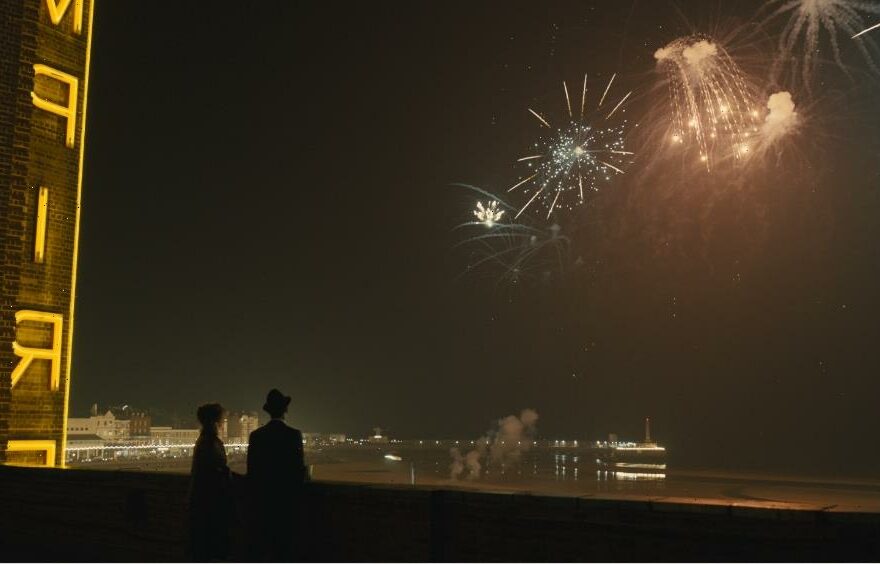When film and stage director Sam Mendes first showed his script for “Empire of Light” to his regular collaborator, cinematographer Roger Deakins, the subject of how to shoot the personal, bittersweet story didn’t even come up, he says.
Rather, it was all about whether Deakins felt something for the central characters, Hillary (Olivia Colman) and Stephen (Micheal Ward), two lost souls brought together by a once-fabulous movie palace in an English seaside town, and whether he wanted to tell their story, Mendes says.
“For Roger,” he explains, speaking at the Camerimage International Film Festival in Torun, Poland, “It’s not like every movie has to be ‘1917’ or ‘Skyfall.’ He wants the movie to be good. It’s why he’s had such a fantastic career – he’s worked on so many different scales. It’s not led by the visual – it’s led by the soul of the film.”
That’s something “Empire of Light” has in abundance, based on the critical and audience acclaim the film was won since it premiered at the Telluride film fest in September.
Mendes’ original script is a relatively simple story of the manager of the Empire cinema, a place that’s fallen far from its former glory, and her love affair with a young, newly hired ticket taker who is facing a world of racism she has little clue about.
And, although Mendes is celebrated for his impressive career, having debuted as director with “American Beauty” in 1999, following up with “Road to Perdition,” “Revolutionary Road” and “1917,” which he co-wrote, screenwriting is something he feels not always confident about, he admits.
“It was quite quick,” he says of the writing process. “But on one level I’ve been thinking about it all my life. It’s about my mother and my childhood and my teenage years. And it all felt very like something I was compelled to do rather than something I decided.”
Even so, Mendes felt he needed a reality check on his story before committing to it. “Now if Roger had said, ‘I’m not sure,’ and my agent and my wife, I wouldn’t have made the film. Because I really couldn’t tell. I still can’t tell on some level. Because when you write it…it’s not the strategic part of the brain that is making the choices. You’re not thinking through, ‘Do I have time to do a big film, or this film or that film?’”
Mendes, who was born in South-East England, knows the world of small-town British 80s culture all too well, he says, but somehow over the years, trying to recount the story of his mother, who struggled with mental health issues, never quite came together – until he hit upon setting the tale in the faded wonder world of the Empire.
“Roger said when he read it he was expecting to read something different. And I said, I know this is not what you were expecting but I want to do this instead – and gave him the whole script. And he was like, ‘Wow.’”
It was as if the entire story was just waiting for the moment it was ready to appear, Mendes says. “It came to me and just announced itself. And that’s never happened to me before.
It was when he put together Hillary, “who in a very strong way is based upon my mother,” and Stephen, “who is going through in many ways the things that I went through – I’m not Black, I didn’t go through the racism – but the appearance of the political landscape at the time, the music, the movies, and you put these together in this centrifugal force, the cinema. That works – and I started writing it.”
When the time came to planning the visuals for “Empire of Light,” which renders the magic of cinema powerfully, while also re-creating the turbulent era of Mendes’ youth, he says Deakins was readily able to imagine the film’s unique look.
“You talk about it. You sit in a room. He sees images very quickly. You need to go to the location together. Some of the best conversations I had with Roger were just sitting on a bench at the location, staring out at the sea. We sat in a bus shelter looking out at the beach in Margate.
It was at that moment, he says, they both began to feel the power of the setting. “TS Eliot wrote ‘The Waste Land’ here,” Mendes recalls: “‘On Margate sands, I can connect nothing with nothing.’ J.M.W. Turner painted his great landscapes here because he said it has the most beautiful skies in Europe.
But stunning visuals are not the goal when collaborating with Deakins, says Mendes. “The joy of working with him is you don’t feel he’s looking for ways of showing off, ever. He’s only looking for the best solution to the scene to express it somehow. And if that solution is very simple and naturalistic, then that’s what we’ll go for.”
Recalling Deakins’ work with the Coen brothers on films such as “Fargo,” he adds: “If you’d read that script, it’s not like you would have said there are wonderful visual opportunities there. Nor is it a particularly expressionistic film. But the clarity of his vision, the specificity of his atmosphere, is created by someone who just says, ‘I like this film – I’m going to commit to whatever it takes to make it work.’”
The central theme of “Empire,” the almost transcendent power of movies, is something most people are feeling deeply in these post-COVID days, and Mendes admits he gained a new appreciation for the big screen collective experience during lockdown – and the dream to return to “these secular rituals.”
“It’s like we need some destination, some sort of gathering. It’s really important, just that sort of sharing of enthusiasm and love – sitting in a cinema again.”
Read More About:
Source: Read Full Article
